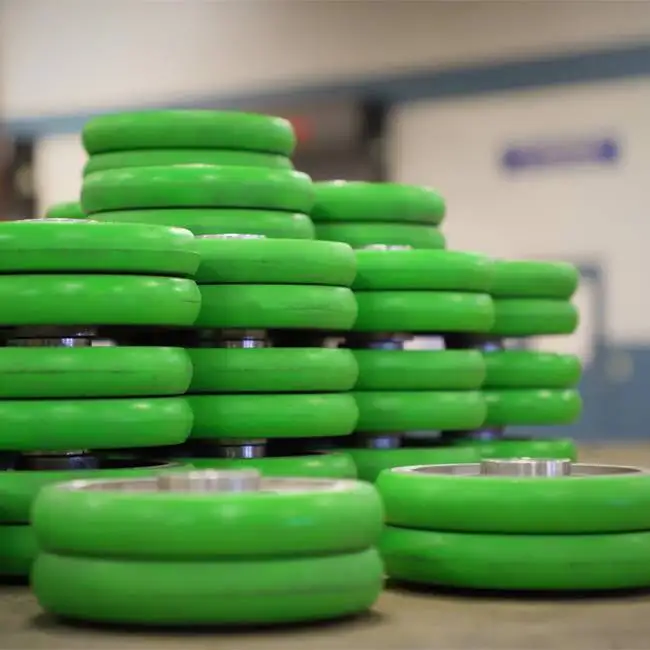

Polyurethane caster wheels are a popular wheel tread for use on industrial wheels, whether it is in a caster application or drive wheel applications. Opting for poly wheels in specific caster applications is a wise choice, given their ability to reduce noise and push force while effectively and efficiently increasing wheel life. Here are the most compelling reasons:
For applications requiring a higher load-bearing capacity, polyurethane caster wheels are often favored over rubber alternatives. Poly wheels can provide a greater load-bearing capacity while still providing the benefits of a rubber caster, such as noise reduction, shock absorption, and floor protection.
Polyurethane caster wheels are a popular choice in industrial applications because of their quietness in operation when compared to harder wheels such as steel or cast iron. The polyurethane acts as a shock absorber and helps cushion the ride. It also absorbs bumps from uneven terrain. Where OSHA regulations come into play, using polyurethane instead of steel or cast iron wheels can significantly reduce noise levels to help protect your employees’ hearing.
Polyurethane caster wheels rule in applications where protecting the floor is critical. The polyurethane will deflect and create a much larger footprint than harder wheel materials, such as nylon. A larger surface area helps reduce the stress concentration on floors and keep them in better shape for longer periods. For plants whose floors are critical to your operation, and cannot be damaged or have foreign object debris (FOD), a poly wheel may be the preferred choice.
Another benefit to polyurethane caster wheel in industrial applications is the coefficient of friction of the material. This value describes the ratio of the force of friction between two bodies and the force pressing them together. Rougher surfaces tend to have higher effective values while smoother surfaces have lower ones due to the friction they generate when pressed together.
Polyurethane tends to be a grippy material, which is an important consideration as sliding can be a problem for harder wheel materials. Polyurethane also provides excellent traction to drive wheels and helps to reduce the amount of load on the wheel to achieve the desired driving force.
There are many different types of polyurethanes that have varying levels of resistance to specific environments or conditions. For example, chemicals, solvents, or even water. (We list some of the different types below). In humid or wet environments, certain polyurethanes will not break down or corrode in the presence of water. In situations where chemical exposure is a problem, a different type of polyurethane can be used to prolong the wheel’s life.
Polyurethane wheels have many benefits in industrial caster wheel applications, and the reasons above discuss some of the more popular ones. Polyurethanes can provide resistance to corrosion, protect floors, and reduce noise, all while providing a material that can handle a lot of capacity. Switching to a polyurethane wheel could have a dramatic impact on the success of your operation.
Caster Concepts has a wide arrange of polyurethane formulations and in-house wheel molding, allowing us to design and produce the optimal wheel for you material handling challenge.